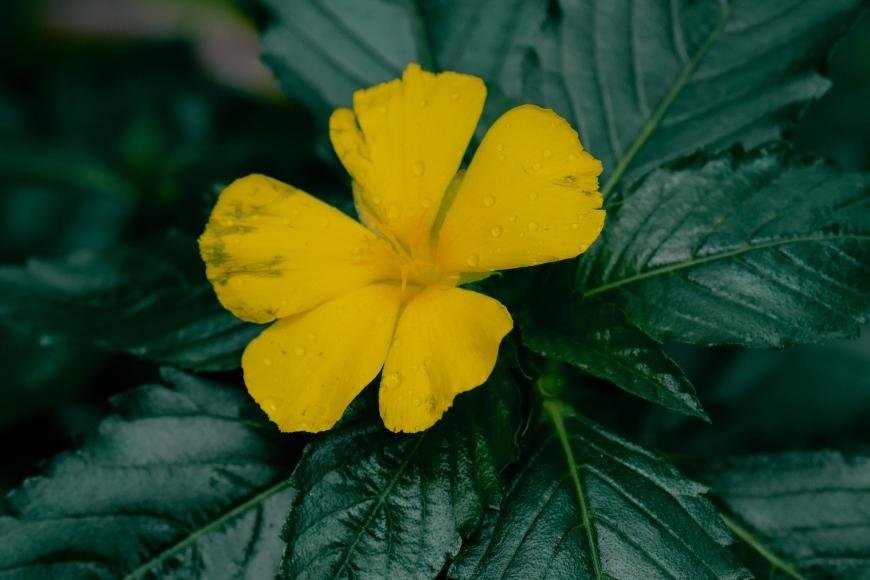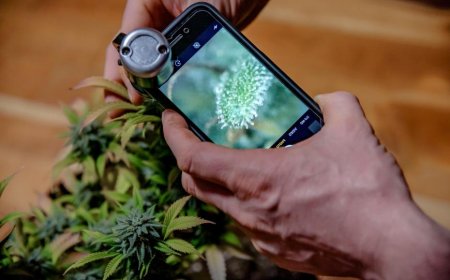What Is Damiana?
Explore what Damiana is in our guide, delving into its history, effects, and safety of this intriguing Mexican plant used for centuries.

What is Damiana? As a young adult interested in recreational plants, you might have come across this intriguing herb. Damiana, scientifically known as Turnera diffusa or Turnera aphrodisiaca, is a small shrub native to Central and South America. Its yellow flowers and distinctive aroma have made it popular among indigenous cultures for centuries.
In this blog post, we will dive deep into the historical use of damiana by various civilizations before the Spanish crossed the ocean. We'll explore its potential effects on mood and libido that have led many people to consider taking damiana in different forms such as tea or supplements.
Additionally, we'll discuss damiana liqueur - an enticing concoction often associated with Mexican culture - while also shedding light on possible side effects and safety concerns surrounding this plant. By the end of this post, you will be well-versed in all aspects of damiana's fascinating history and modern applications.
Table of Contents:
- What is Damiana?
- Historical Use of Damiana
- Effects of Damiana
- What is Damiana Liqueur?
- Side Effects of Damiana
- Is Damiana Safe?
- FAQs in Relation to What is Damiana?
- Conclusion
What is Damiana?
Damiana (Turnera diffusa) is an herb native to Central and South America, which has been used for centuries as a medicinal plant and aphrodisiac. It grows in the form of a small shrub with yellow flowers and small leaves that have a strong aromatic smell when crushed. Damiana contains active compounds such as damianin, tannins, essential oils, flavonoids and resins. Traditionally it was brewed into tea or smoked as part of spiritual rituals or ceremonies.
Native Mexicans have long used damiana for its purported healing properties, including relieving digestive issues such as constipation, indigestion and bloating. In addition to this use, many people also believe that damiana can increase libido and sexual performance due to its reputed aphrodisiac qualities. It has even been known to be included in traditional love potions.
Consuming larger doses than recommended can lead to mild visual hallucinations, which should be taken seriously unless they are combined with other drugs or alcohols. Those who take damiana orally or smoke it may experience an energizing euphoria after about 15-30 minutes, though this is much less potent than the psychotropic effects of THC.
Consuming Damiana liqueur should be done responsibly as there is no scientific evidence to back up any claims of health benefits associated with drinking it. However, this type of alcoholic beverage has become popular in Latin America and is often served neat over ice cubes or mixed into cocktails like margaritas - especially on special occasions such as weddings or birthdays where it's said to bring good luck.
Before taking any herbal supplement, it is imperative to consult a doctor just like any other medication prescribed by them would require prior consultation. Despite typically being safe in sensible amounts, potential adverse reactions may include nausea/vomiting, dizziness, headache, restlessness, anxiety, dry mouth, increased heart rate and irritability as well as changes to blood pressure and body temperature. In rare cases more serious reactions have been reported especially when combined with other substances such as alcohols; thus exercising caution is highly recommended.
Generally speaking, yes, Damiana is safe; however, please bear in mind that everyone reacts differently. If you have any qualms about taking Damiana, it is recommended to consult a medical professional prior to consumption, particularly if one has allergies, asthma, diabetes or hypertension since some medicines may interact unfavorably depending on individual conditions. Remember: prevention is better than cure - always.
Damiana has a long history of being used as an aphrodisiac, tonic and medicinal plant, with its potential benefits still under exploration today. Interesting to investigate, its potential advantages are still being investigated in the present day. With its long history of use in traditional medicine, we can now take a look at the historical uses of Damiana throughout time.
Historical Use of Damiana

The Mayans and Aztecs of long ago held Damiana in high regard, utilizing it for its therapeutic benefits as well as a love-inducing stimulant. The ancient cultures believed that this plant had special powers that could improve physical health, increase libido, and even enhance spiritual connections. In addition to being used medicinally, Damiana was also consumed in a liqueur form by many cultures throughout Central America. This liqueur is still popular today due to its unique flavor profile and purported benefits.
For centuries, Damiana has been employed as a medicinal agent to address various ailments such as headaches, nervousness, despondency, digestive disturbances and female reproductive issues like menstrual cramps. It was also commonly taken before or during ritual ceremonies or sexual activities because of its perceived ability to heighten arousal levels.
In more recent times Damiana has become increasingly popular among recreational drug users looking for an herbal alternative to illicit substances like marijuana or psychedelics such as LSD or psilocybin mushrooms (“magic mushrooms”). Many people report feeling relaxed after consuming damiana either alone or with other drugs like cannabis; however some users have reported experiencing mild hallucinations when taking larger doses of the herb on its own.
The Aztecs of antiquity utilized damiana as a medicinal and libido-enhancing herb. Moving on from this topic, we will explore the effects that Damiana has on its users.
Effects of Damiana
For centuries, damiana has been used in traditional medicine and recreationally for its mild psychoactive effects that can be beneficial for relaxation or heightened libido. The main active compounds in damiana are the terpenoids, flavonoids, and essential oils found within the leaves of the plant.
When taken orally or smoked, damiana produces a feeling of relaxation with slight euphoria and increased energy levels. This makes it popular among those seeking an uplifting experience without having to resort to more potent substances like psychedelics or cannabis. Damiana has the potential to stimulate arousal, due to its capacity for increasing circulation throughout the body and calming frazzled nerves.
One of the most common side effects associated with taking damiana is headaches caused by dehydration since it tends to draw water from other parts of your body when ingested. To avoid this issue you should make sure you drink plenty of fluids before consuming any form of damiana product such as tea or tincture extractions made from its leaves or flowers. Additionally, some people may experience nausea after ingesting large doses so it’s important not to overdo it if you plan on trying out this herb for yourself.
It is important to consider not only the potential side effects, but also how safe using damiana really is overall - especially if you plan on mixing it with other substances like alcohol or cannabis products which could potentially interact negatively when combined together at high dosages. Fortunately, there have been no reports linking serious health issues directly to using this particular herbal supplement alone so far, making it relatively safe compared to more dangerous drugs out there today according to its current research data available right now. Despite the lack of serious health issues associated with damiana, further research is still necessary to determine if its safety holds up over time and across different demographics.
The effects of Damiana are varied and depend on the individual, so it is important to be mindful when consuming this herb. Moving forward, let's explore what Damiana Liqueur is and how it can affect us.
What is Damiana Liqueur?

Damiana liqueur is an alcoholic drink crafted from a Mexican and Central American shrub. The leaves of this plant have been used for centuries by indigenous peoples in traditional medicine as well as for recreational purposes. Damiana liqueur has a distinct flavor, combining sweet and spicy notes of cinnamon, nutmeg, licorice, and vanilla. Damiana liqueur is typically served straight or mixed into cocktails such as margaritas or mojitos.
The history of damiana dates back thousands of years when it was first discovered by ancient civilizations who believed it had powerful medicinal properties.
When consumed responsibly in small doses (no more than one shot), damiana liqueur can produce feelings of relaxation without any negative side effects like hangovers or memory loss associated with alcohol consumption. Young folks seeking a way to de-stress without the consequences of excessive drinking opt for damiana liqueur, which can offer relaxation when taken in moderation.
For those with a more acquired taste, damiana liqueur has a sweet yet spicy flavor reminiscent of chai tea but slightly less intense than rum-based drinks like mojitos or piña coladas. Its unique combination of nutmeg and cinnamon combined with hints of honeyed sweetness from the sugar cane distillate used in production process can be quite palatable for some; especially if they're already familiar with other types herbal liquors such as amaro or absinthe. Thus, this drink could serve as an ideal alternative to conventional alcoholic beverages for individuals seeking to relax without getting too intoxicated or experiencing adverse reactions from overindulging.
In conclusion, although there are still some unknowns surrounding its exact composition, what we do know is that consuming damiana liqueur responsibly can provide users with relaxing effects without any major risks associated with excessive alcohol consumption. Furthermore, while not everyone may enjoy its unusual flavor profile right away, many find themselves growing accustomed over time making this herbally infused drink perfect for those seeking out new experiences on their journey towards self-discovery.
Damiana liqueur is a sweet herbal beverage made from the damiana plant, and it has been used for centuries as an aphrodisiac. Despite its many advantages, one should be aware of the potential risks before consuming this drink. In the following section, we'll explore some potential drawbacks of consuming damiana liqueur.
Side Effects of Damiana
Damiana, a long-utilized botanical, has been employed for ages as an invigorating and libido-enhancing agent. Despite its possible benefits, damiana use can also carry certain risks.
Nausea is one of the most common side effects of damiana. The intensity of the nausea can vary from slight to extreme, depending on how much and regularly one takes damiana. It’s important to start off slowly when taking any new supplement or drug, especially if you’re not sure what the dosage should be or if your body isn’t used to it yet.
Dizziness is another possible side effect of taking damiana. If you experience this symptom after consuming damiana, reduce your dose or discontinue use until the feeling passes completely. Some people report feeling lightheadedness or faintness after using this herb; again, reducing your dose may help alleviate these symptoms in some cases.
Headaches are another possible side effect of using Damiana supplements or liqueur made from this plant extract; however, they usually don't last long and tend to go away once the substance leaves your system. You should still consult with a doctor before continuing usage if headaches persist beyond a few days though as they could be indicative of something more serious going on inside your body such as dehydration or electrolyte imbalance due to excessive sweating while exercising etc...
Dry mouth is also known to occur when taking Damiana supplements, but luckily it is relatively easy to treat. Drinking plenty of fluids throughout the day and avoiding sugary drinks like soda can help alleviate this symptom. Sugary drinks can worsen dehydration over time, so it is best to stick with water whenever possible.
Though a few light adverse effects have been reported in connection with Damiana use, it is usually thought to be secure when taken moderately. Despite its generally accepted safety, caution should be taken when using Damiana due to potential risks that require further research. Moving on, let us explore whether or not Damiana can actually be considered a safe substance.
Is Damiana Safe?
When it comes to safety, there have been no major reports of adverse reactions associated with the herb when taken as directed. However, some users may experience mild side effects such as headaches or nausea after taking Damiana supplements or extracts. It's worth noting that these reactions may be fleeting and typically dissipate without any medical assistance.
Flavonoids, terpenes and other bioactive compounds are the primary components of Damiana, which can have varying effects depending on personal characteristics such as age or health status. Therefore it’s best to consult a doctor before taking any type of herbal supplement including Damiana so they can assess your risk level for potential interactions with medications you might be taking or existing conditions you may have.
For adults aged 18-65 years old, the suggested dosage of Damiana extract or powder is usually 1-2 teaspoons per day; however, this can differ depending on individual variables such as body size and weight. If opting for a liquid tincture form, aim for 2-4 drops twice daily instead - but be sure to consult with your doctor before beginning any new regimen.
It’s also worth mentioning that due to its possible sedative effect it shouldn't be combined with alcohol because this could increase drowsiness levels significantly; same goes if you plan on operating heavy machinery while under its influence too – always err on the side of caution here. Lastly pregnant women should avoid using damina altogether since there isn't enough research done yet about how exactly it affects fetal development so better safe than sorry.
Overall, Damiana appears to be quite safe when used responsibly according to established guidelines. However, like all supplements, it is important to speak with your healthcare provider beforehand so they know what kind of herbs and medicines you are consuming regularly. Taking extra caution when dealing with something potentially risky such as drugs or supplements can never hurt.
FAQs in Relation to What is Damiana?
What is damiana and what is it used for?
Damiana is an herb native to Mexico, Central America and the Caribbean. For centuries, Damiana has been used as a natural remedy to address issues such as anxiety, depression and impotence. The terpenoids present in the leaves of this herb have been found to be mildly energizing when consumed. Damiana can be taken in tea form or smoked like tobacco; it is said to produce feelings of euphoria and relaxation. In recent years, damiana has become popular among recreational drug users due to its calming effects without any serious side-effects associated with other drugs such as cannabis or psychedelics.
What does damiana do to the brain?
Damiana has been used for centuries as a traditional herbal remedy and is thought to have mild psychoactive effects. By stimulating the release of serotonin, dopamine and GABA neurotransmitters, Damiana may act on the brain to help reduce anxiety levels, improve moods and provide calming sensations. These hormones are known to help reduce anxiety levels, improve moods, and provide calming sensations. Damiana has been observed to raise blood circulation in certain parts of the brain, which may result in augmented cognitive abilities like increased attention and concentration. In addition, it has been shown to enhance sexual pleasure due its ability to boost libido levels.
Who should not use damiana?
Pregnant or nursing women, those with a prior heart condition, hypertension, liver issues, renal illnesses, mental illness or panic disorders should not utilize damiana. People who are taking prescription medications for any condition should consult their doctor before using damiana as it may interact with certain drugs. Additionally, those below 18 years of age and individuals who have experienced negative effects from other herbal remedies should not utilize damiana.
Conclusion
In conclusion, damiana is an herb with a long history of use in traditional medicine. It has been used to treat digestive problems and improve sexual health for centuries. Although there are some potential benefits, the safety and effectiveness of damiana remain largely unknown. Before taking any herbal supplement or using any alternative treatment, always consult your doctor first to make sure that the damiana you’re consuming is safe for you personally.






































































































































